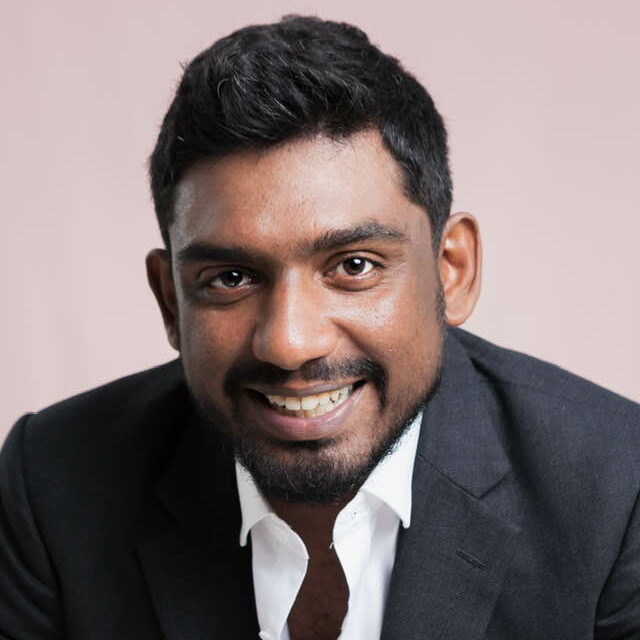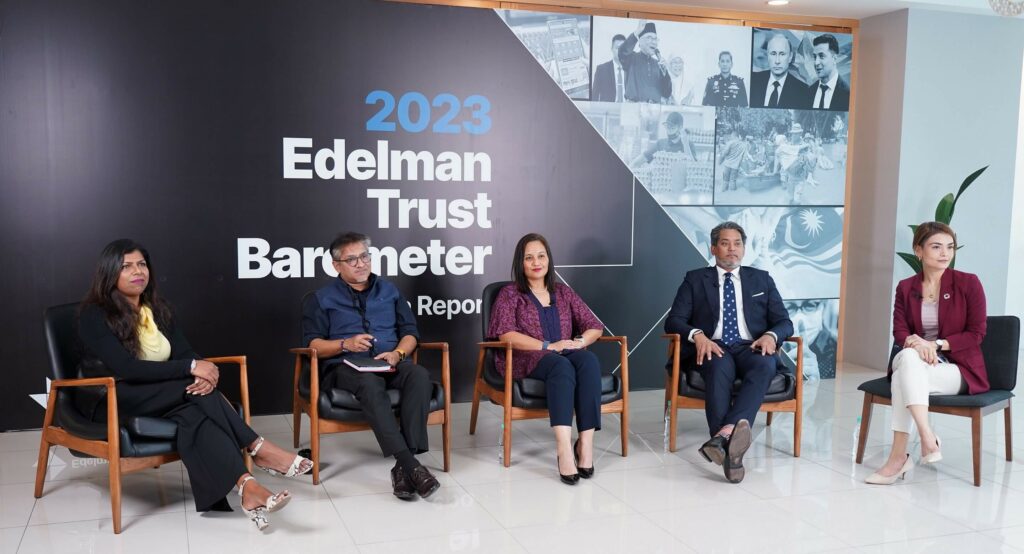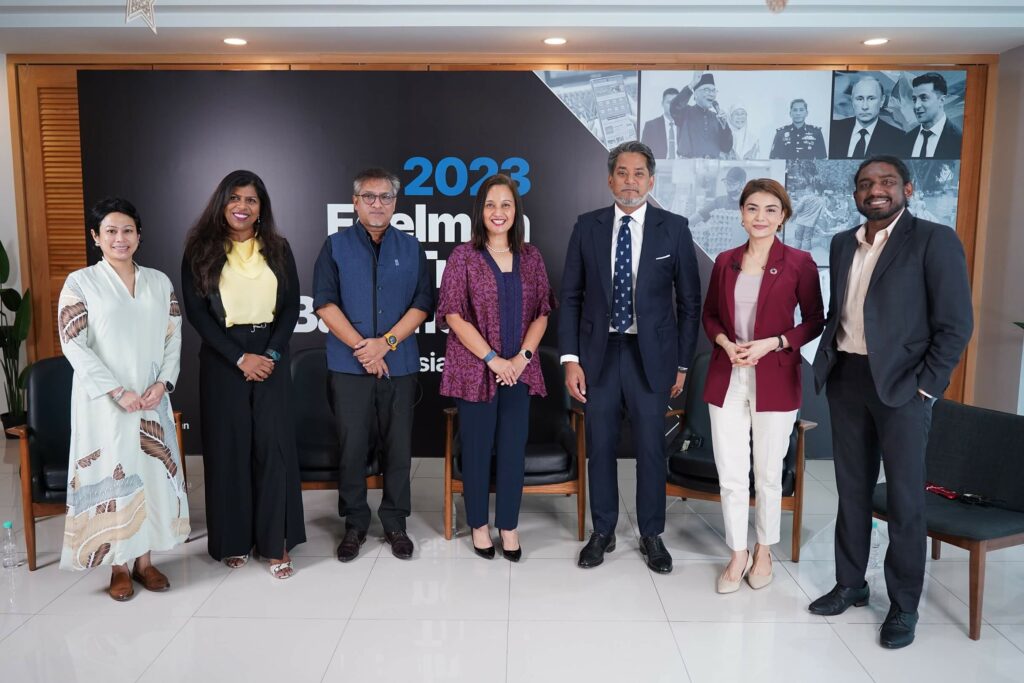At the heart of the recent Edelman Trust Barometer Malaysia Report is the unveiling of an impending mass-class divide. Edelman Malaysia, through the report, seeks to alert and guide core societal institutions towards mitigating this socioeconomic challenge. Christopher de Cruz, COO of Edelman Malaysia and Head of Crisis, Southeast Asia, articulated to Marketing In Asia.

This is what Edelman does with the Trust Barometer report every year…we measure levels of global and local trust in four core institutions – government, media, NGOs, business.
Christopher de Cruz
The synergy of leadership, vision, and advocacy from these core institutions is instrumental in preventing economic polarisation. Notably, Edelman Malaysia engaged representatives from these institutions in a panel discussion to deliberate on their roles in the socio-economic events of 2022.
The Trust Panel: How Diversity Sparked Conversation

The Trust Barometer’s panel discussion featured a cross-section of industry professionals who can provide a diverse range of opinions, and representatives of the different stakeholders in the report – citizens, consumers, leaders, industry experts, and current and past government representatives. Edelman assembles panellists globally to embody diverse perspectives that lead to a rich dialogue, representative of the four core institutions focused in the Trust Barometer – Government, Media, Businesses, and NGOs.
Trust Hyperlocalisation: Malaysia’s Trust Index Ranking
According to the Trust Barometer, Malaysia ranks 9th out of 28 surveyed countries in the Global Trust Index. The top three countries – from the top – are China, Indonesia, and the UAE, and the bottom three countries are the United Kingdom, Japan, and South Korea. De Cruz believes the nation’s strong trust within communities stems from a hyperlocalisation of trust. He defines hyper-localisation as Malaysians having a higher level of trust in people with whom they have real-life interactions within their communities.
Last year, we saw Malaysia’s strong sense of unity in the ways communities rose to help one another with movements such as the #KitaJagaKita initiative during the pandemic – a true showcase of Malaysia’s civic- mindedness.
Christopher de Cruz
Building Economic Optimism: Institutional Collaboration
The Trust Barometer underscores the significance of consensus and collaboration among the four core institutions to restore economic optimism in Malaysia. Institutions, particularly government and businesses, need to focus on fair compensation, up-skilling, and community upliftment to combat economic polarisation.
For Business, the message is clear that societal leadership is now a core function; despite their year-on- year decrease in numbers, we see that they are still a trusted institution. The public believes that businesses must continue to lead and hold the mantle of greater expectations and responsibility. Therefore, restoring this nation’s trust and economic optimism can be done by strengthening collaboration between these two institutions.
Christopher de Cruz
Furthermore, Malaysians, are clear that the work towards building stronger trust is not a one- person job. Edelman’s survey shows that Malaysians believe optimal results are 3x more likely if businesses and government work in partnership to build policies and standards that result in a more just, secure, and thriving society.
A Safe Space for Dialogue: The Closed Panel Session

Edelman opted for a closed panel session at the report’s launch to foster a secure environment for panelists to voice their opinions. The attendees and panelists found the discussion fruitful, sparking constructive dialogue on building a better future for Malaysia.
The Importance of Diverse Perspectives: Building Trust
When examining issues of trust, the importance of a multiplicity of perspectives cannot be overstated. It is through the lens of diverse viewpoints that we can fully comprehend the multifaceted nature of trust. “Diverse perspectives lead to more stimulating conversations and help us unlock more actionable items,” he remarked, emphasising the essence of such diversity in crafting a comprehensive picture of the state of trust.
According to the Trust Barometer, the manifestation of trust varies across different sectors and layers of society. For example, this year’s report reveals an 11-point gap between the high-income class and the low-income mass, suggesting that these two groups perceive and experience trust differently within the same society. These groups live in parallel trust realities that need to be explored and addressed individually, a task impossible without diverse representation.
Edelman’s panel discussions encompass representatives from the government, business, media, and NGOs. By including voices from these different sectors, the panel discussions become a platform where the full spectrum of trust can be articulated and evaluated. Each panelist, a representative of their respective institution, brings a unique perspective that enriches the conversation on trust and, importantly, offers insight into how their institution can respond to the findings of the Trust Barometer.
To ensure a balanced and comprehensive discussion, Edelman works closely with the moderator to focus on key points and frequently refer back to the report’s data. A well-structured discussion flow permits each panelist to contribute their expertise and ensures all viewpoints are given due attention. The role of the moderator is also crucial to creating a respectful environment that encourages the expression of diverse viewpoints, a testament to Edelman’s commitment to inclusivity.
Utilising Trust Insights: Driving Positive Change
The Trust Barometer Report is not just a measure of societal trust but also a valuable tool in driving positive societal change. The insights from the Trust Barometer help inform the strategies that Edelman Malaysia puts forth to its partners. The goal of this is two-fold: first, to tackle specific societal issues by shifting focus towards solutions and strategies derived from the Trust Barometer insights, and second, to inspire other key industry players to work towards enhancing the nation’s trust in the core institutions.
Trust, as per Edelman’s insights, is the bridge between the known and the unknown. It’s not just about deciphering the data but also about providing a clear, actionable path forward. With the Trust Barometer data, Edelman aims to make the uncertainties a little more understandable, thus fostering an environment where the unknown is less daunting and more approachable.
Also read: DoubleVerify’s Revolutionary Attention Activation Solution: A Game Changer In Ad Performance Optimisation
Christopher de Cruz encourages other organisations to follow suit. Here are a few starting points for businesses:
- Get to a simple measure of ESG so you can demonstrate your societal impact. At present, there are a dizzying 180 different approaches. A simple and single standard, which is universally accepted, will be much easier to defend when challenged by political or vested interests. KPIs (key performance indicators) that show Business is indeed keeping its word on ESG goals while building support for innovation would allow companies to calculate their progress and respond to financial institutions evaluating potential investments.
- Make Diversity, Equity, and Inclusion a fundamental part of business strategy. DE&I must live beyond just promises. Use the supply chain to insist on diversity at medium and small businesses as has been done in sustainability.
- Hold divisive forces accountable. Pull advertising money from media platforms that spread disinformation. Defend facts by showing the science behind innovation and publishing on your own platforms. Stop speaking to media that push conspiracy theories. Stand up to politicians who may try to bully you.
- Work with and not against Government. That goes especially for policies that raise living standards, offer opportunities for continuing education/reskilling, and improve public safety. That also means partnership with Government on a broader set of issues including privacy and security, geopolitics, plus proper supervision of new markets/areas such as crypto and Artificial Intelligence.
“When we have a better understanding of this dynamic, organisations can be more mindful in creating products, services, and solutions that truly serve the community, with the purpose of bridging and rebuilding the nation’s trust.”
Christopher de Cruz
In a world where trust bridges the known and the unknown, Edelman Malaysia’s 2023 Trust Barometer Report is not just an examination of today’s trust landscape, but a beacon guiding institutions towards a future where trust and societal interests align.
















